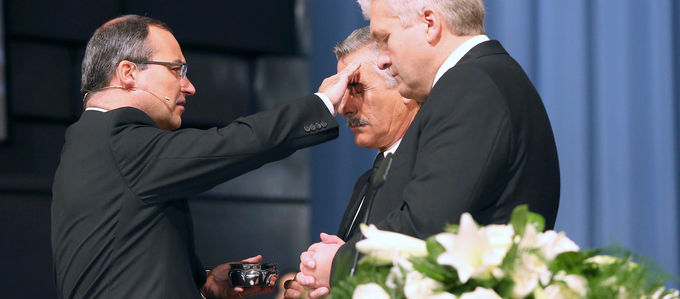
When is the table of the Lord prepared? And how often should believers come to the table? In the past and present of the various denominations, the gamut of when to partake in the Lord’s Supper runs from once a day to once a year—let’s take a tour through some of the churches.
“Every day!” That was the motto of the early Christians in the house congregations of the Greek cultural domain. Of course, this was at a time when the Lord’s Supper was still called “breaking bread” and amounted to little more than an expanded prayer of thanksgiving at dinner together. On the other hand, the Jewish Christians—who still followed in the tradition of the synagogue—celebrated the meal once each week, namely on the Sabbath, which was the Saturday. Soon thereafter, the celebration of the Lord’s Supper in both cultural circles was postponed to the Lord’s Day, namely the Sunday, the day of the resurrection.
At a distance from the altar
During the Middle Ages, the celebration of the Eucharist developed increasingly into a kind of drama within the sanctuary, in which the congregation gradually took on the role of passive spectator. In this situation, the believers went without bread and wine, and contented themselves with “eye communion”. In order to counteract this, the Catholic Lateran Council of 1215 declared it as the duty of each believer to come to the table of the Lord at least once each year.
This was yet another of the elements which the Reformation sought to improve. Thus there could be no better response from Luther and Co. than to celebrate Holy Communion every Sunday. But given Apostle Paul’s warning not to condemn oneself by partaking unworthily of the Lord’s Supper, the number of visitors to the table quickly began to decrease. So it was that by the middle of the sixteenth century already, many Protestant congregations were only offering Holy Communion four times each year. The practice was very similar in the Anglican Church until well into the twentieth century.
With the liturgical movement of the nineteenth and twentieth centuries, active participation in the sacrament came back into focus—both on the Protestant and the Catholic side. This was further reinforced by ecumenical efforts and other explicit reforms ushered in by church leadership.
As often as possible today
Today Catholic parishes offer the Eucharist at every mass, that is, on Sundays and on holy days at least. Quite a few of them also celebrate an evening mass. Church members are allowed to participate in every celebration, but no more than twice in the same day. They are obliged to partake in Communion at least once each year.
The churches of the Reformed tradition do not have such a requirement. Some Protestant national churches, however, do require their congregational leaders to offer the Lord’s Supper at least once a month. Many congregations celebrate once a week.
The New Apostolic Church usually dispenses the sacrament twice per week: up until 1998 in each of the two divine services that were conducted every Sunday, and since then in the single Sunday divine service as well as in the Wednesday or Thursday evening services, where they occur. Why? “Because it sustains human beings in their fellowship of life with Jesus Christ,” explains the Catechism in Questions and Answers: “We thereby absorb the nature of Jesus.”
Outside of the divine service is the exception
The Catholic, Orthodox, Protestant, and New Apostolic Churches are all agreed that the sacrament of the altar should be part of the divine service—in nearly every case. The Church Father Justin Martyr, however, already in the second century made reference to the one exception that is still just as common to all: a portion of the consecrated gift is “sent by the Deacons” to “those who are absent”—an early reference to the care of the sick, the weak, and the elderly.
In Catholicism this is known as the Communion of the sick, because the main focus is the dispensation and receiving of the sacrament. Protestants also have their own Communion celebration for the sick, which includes the words of institution. This form of pastoral care is so important to the New Apostolic Church that it merits a chapter all to itself in Volume 2 of Liturgy of the Divine Services. And there we read that one of the principles of the ministration visit is that it should be “carried out as far as possible in the sequence usual in divine services”.
Photo: rawf8














